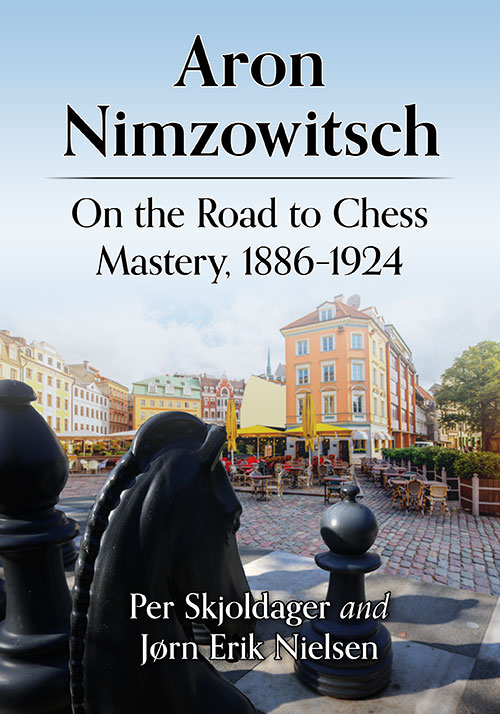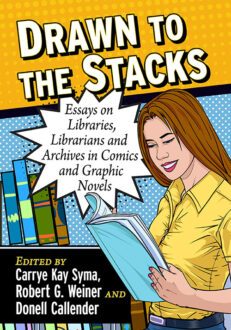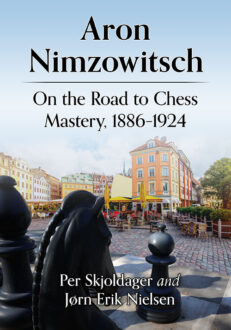Aron Nimzowitsch
On the Road to Chess Mastery, 1886–1924
Paperback Edition$59.95
In stock
About the Book
One of the greatest chess legends of all time, Aron Nimzowitsch (1886–1935), is best known for founding the Hypermodernism school of chess, which emerged after World War I to challenge the chess ideologies of traditional central European masters. This first full-scale biography of Nimzowitsch chronicles his early life in Denmark, his family and education, and his fascination with the game that would become the focus of his life. Also included are explorations of his tournament games and records, his dispute with influential chess teacher Siegbert Tarrasch, and his role in the development of Hypermodern Chess. With detailed accounts of nearly 450 games and the only narrative of Nimzowitsch from 1914 to 1924, a period formerly cloaked in mystery, this volume offers the most thorough profile available of one of chess’s greatest innovators.
About the Author(s)
Bibliographic Details
Per Skjoldager and Jørn Erik Nielsen
Format: softcover (7 x 10)
Pages: 468
Bibliographic Info: 426 annotated games, 88 photos, 10 maps, appendices, notes, bibliography, indexes
Copyright Date: 2023 [2012]
pISBN: 978-1-4766-9137-4
eISBN: 978-1-4766-1832-6
Imprint: McFarland
Table of Contents
Acknowledgments and Thanks v
Preface 1
Chapter 1 : 1886-1904
The Jews of Riga 3
The Nimzowitsch family 4
The spelling of the name 7
The young Nimzowitsch 8
First published game 10
Königsberg in 1902 and Berlin in 1903 10
Göttingen in 1903, then back in Berlin in 1904 15
Coburg 1904 18
First game against Tarrasch, Nürnberg 23
Chapter 2 : 1905-1906
Vienna 1905 25
Munich in 1905: First match against Spielmann 30
Munich in 1905: The first simul 33
Barmen 1905 34
After Barmen 45
Education 47
Zürich in 1905 49
Match against Lurie, Riga in 1906 50
Berlin in 1906 51
Munich 1906 52
Chapter 3 : 1907-1909
Munich in 1907 59
To Zürich, then a simul in Winterthur 60
Ostende 1907 60
Karlsbad 1907 75
Munich in 1907, and a simul 93
Second Match against Spielmann, in Munich, 1908 95
Chess in the Baltic, Riga in 1909 98
Chapter 4 : 1910
Professional life in Riga 100
Preparing for Hamburg 1910 104
Hamburg 1910 110
Visit to Dorpat 120
Back in Riga 125
Visit to Pernau 127
Chapter 5 : 1911
Leaving Riga 128
Match against Leonhardt, Hamburg 128
The Tarrasch-Nimzowitsch dispute, 1911 to 1913 133
San Sebastian 1911 134
Correspondence match against Behting 143
Karlsbad 1911 145
Another visit to Dorpat 165
Chapter 6 : 1912
Marshall in the Baltic 170
Riddles by A.N. 172
Rigasche Rundschau in 1912 172
San Sebastian 1912 173
Nimzowitsch: An open letter to Tarrasch 188
Vilnius 1912 189
Chapter 7 : 1913
Rigasche Rundschau in 1913 202
Nimzowitsch on The Modern Chess Game by Tarrasch 204
Nimzowitsch: “The New System” 210
Nimzowitsch on the surrender of the center 214
Father of Hypermodernism 216
Match against Giese, Riga 220
Correspondence match against Fluss 221
Capablanca in Riga 223
Chapter 8 : 1914
Rigasche Rundschau in 1914 225
All-Russian Tournament of Masters at St. Petersburg 226
Playoff match against Alekhine 237
St. Petersburg 1914 240
Der alte Ganeff 251
The Great War and Riga 254
Chapter 9 : 1915-1919
World War I at a glance 257
Riga in 1915 258
In the Russian Army, 1916, out 1917 259
Riga under German rule, 1918 262
Chess editor of the Baltische Zeitung 264
Riga simuls 265
Latvian independence, then the Bolsheviks 266
Liberated by the anti–Bolsheviks 269
Chess editor of the Rigasche Rundschau 271
At war with Russia and Germany 272
Chapter 10 : 1920
Simuls in Latvia, 1920 274
Heading for Sweden 277
Göteborg 1920 278
Match against Bogoljubow, Stockholm 289
Stockholm simuls 292
Second Stockholm Jubilee Tournament 295
Chapter 11 : 1921
Swedish tour, January to March 305
Mysterious matches 311
Visit to Kristiania (Oslo) 317
Visit to Bergen 321
Summer vacation 322
Back to Bergen, Norwegian tour 325
Chapter 12 : 1922
Nimzowitsch in Bergen 327
Swedish Tour, January to March 331
Second match against Håkansson 334
Back in Stockholm 336
Visit to Denmark 337
Danish tour, April to June 338
Summer vacation 344
Further Danish tour, October to November 348
Copenhagen 1922 350
Chapter 13 : 1923
Match against Brinckmann 354
A small tour in Jutland 357
Copenhagen chess clubs 358
Danish tour, February to March 359
Copenhagen 1923 363
Nimzowitsch the smoker 368
Back to work 375
Karlsbad 1923 377
Danish Tour, October to December 391
Chapter 14 : 1924
Simul tour in March and April 395
Correspondence match against Krause 400
On vacation at Vidtskue 404
Copenhagen 1924 (Nordic tournament) 405
Danish Tour, October to December 419
Organizing a Simul Tour to Norway 423
Appendix A. Puzzles and Studies 427
Appendix B. Schaie Niemzowitsch Games and Problems 431
Bibliography 435
Index to Games by Opponent 439
Index to Openings (ECO Codes) 442
Index to Openings (Traditional Names) 445
General Index 447
Book Reviews & Awards
- Book of the Year—Chess Cafe
- “Skjoldager and Nielsen have produced a magnificent book which not only surpasses everything else we have ever seen on the subject of Nimzowitsch but also one which enjoys the extremely high production values typical of McFarland. The depth of research is apparent from the very first page…the book contains an excellent collection of games. This is the finest book written on Aron Nimzowitsch and the authors should be applauded for their efforts. In my opinion this is easily the best and most important chess book of 2012, a fascinating book on a fascinating man”—Chess
- “At last we have a magnificent biography of the famous grandmaster, Aron Nimzowitsch. This volume tells his story up to 1924 in great detail…exhaustive”—British Chess Magazine
- “An epic piece of work…splendid, meticulously researched…serves as a critical biography as well as a repository of nearly four-hundred fifty of the Master’s games…a substantial reference volume which traces Nimzowitsch’s life chronologically,while also providing a treasury of charts, drawings and photographs to bring this intriguing chess master into contemporary understanding…the most comprehensive treatment available of Nimzowitsch’s life and work up to 1924…uncovers numerous sources that provide as full as possible a picture of this chess genius. This book will take an esteemed place in chess literature and is gratefully received”—IM John Donaldson (JeremySilman.com)
- “Supremely well researched”—Edward Winter, Chess Notes
- “Fills in a big gap in the chess literature…this book has everything you could want and more…. The authors have produced a fine tribute to one of the founding fathers of Hypermodern chess. The physical qualities of this book are of the highest standard…beautifully and sturdily bound…will sit proudly on any shelf. This is a book for all lovers of chess history. Strongly recommended!”—Chess Today
- “The first fully-fledged biography…produced by McFarland publishers in the impeccable way that they are known for. The authors have left no stone unturned to find a wealth of unknown material about the life and games of Nimzowitsch. Many interesting and beautiful old photographs adorn the well-written text. A great book”—New In Chess
- “Truly exceptional book”—Chesshistory.com,
- “Merely opening this book might immediately raise the reader’s pulse with beautiful page spreads, solid binding and a cover that feels inviting. I couldn’t wait to get my hands on a copy, both for the scholarship I knew it would contain, and for the history it was sure to reveal about chess in a bygone era. Part biography and part games collection, this compendium captures a golden age of chess culture through the life of Aron Nimzowitsch, a progressive force in the growth of of twentieth century chess. Skjoldager…has unearthed and compiled a wealth of information about the first part of Nimzowitsch’s life that is a rare combination of comprehensiveness and readability. This may be the most thorough treatment of Nimzowitsch and his times ever in print. This book has everything. Readers interested in early twentieth century chess will find hundreds of games to study. Stories are filled with colorful anecdotes. The book is filled with nostalgia, beauty and atmosphere. The feel of this book is very solid, and its font is easy on the eye, and looks appropriate. Printed in the U.S. on acid free archival stock, all pages are bound together in signatures for durability and permanence. Only the best books are still produced this way. There is far more scholarship in Skjoldager’s book than the average reader might comfortably take in, it is exhaustive in its research and its revelations. Skjoldager and Nielsen have produced a significant work. It is wonderfully written and edited, and beautifully bound and produced. This tribute to Aron Nimzowitsch represents the spirit of traditional book publishing at its unqualified best”—ChessCafe.com.






